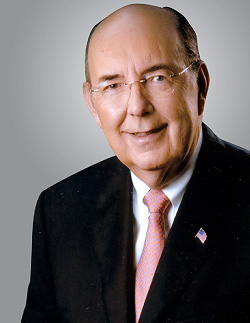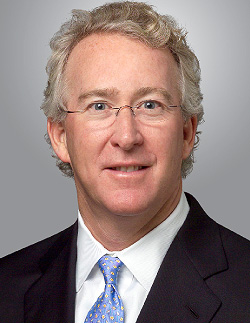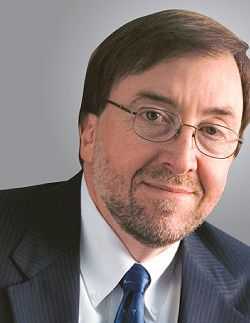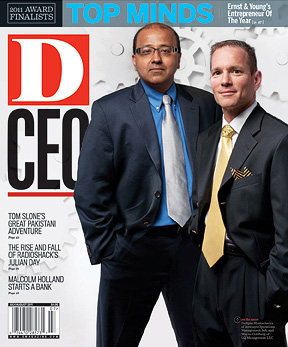
Erle Nye
President
EN Consulting
Erle Nye understands the importance of competition. That’s saying something, considering he spent much of his 44-year career with a company that had a monopoly in its market.
Nye, who was chairman and CEO of the giant utility TXU when he retired in 2005, calls himself a “repentant monopolist.”
He was a key player in the passage of deregulation legislation in Texas in 1999 that established a free market in the state’s utilities industry. During his career with TXU and its predecessor companies, Nye presided over mergers that formed TXU, including joining three Texas power companies with Enserch/Lone Star Gas in 1997. That merger moved the company beyond electricity generation, transmission, and distribution into the natural gas business.
“Regulation is supposed to serve as a substitute for competition, and I would say it doesn’t do that,” Nye says. “Regulation makes everyone the same. Competition is better. It’s more efficient and it encourages innovation.”
Nye is president of his company, EN Consulting, which counts TXU as a client, and he continues to work with a number of civic and charitable organizations. He also has served on numerous boards for Texas universities—including for the University of Texas, Texas A&M, and the SMU Cox School of Business—and he understands the importance of an educated workforce to the state’s economy.
“I worry about the work force and the training of the work force in our state,” he says. “We need more ready-to-work high school graduates for our technology-based economy. Our dropout rate is high and the competency of students coming out of school concerns me. Students are not as well-educated as previous generations.”
Texas’ high number of students for whom English is a second language presents unique challenges, he says. “We have them and we need to make sure they become a productive part of the work force in the future.”
Education reforms that address those issues exist, Nye says. The challenge is finding the money to pay for them. “People say you can’t
solve problems in education with money, but you sure can’t solve them without money.”
Money is also what’s needed to keep the state’s transportation options competitive with other parts of the country. “We have a wonderful airport,” he says, “but we need new roadways.”
Still, Texas has a lot to offer new businesses, including its central location and warm climate. The state always fares better than other parts of the country when the economy takes a tumble, Nye says, and this time is no different. “Texas goes into decline later and comes out of it sooner,” he says. “It’s one of those, ‘We may be slow, but we’re ahead of you,’ situations.” —G.V.

Aubrey McClendon
Co-founder and CEO
Chesapeake Energy Corp.
Changing the trajectory of a big company is much like changing the course of a huge ship—it takes awhile.
A notable exception to that rule is Chesapeake Energy Corp., based in Oklahoma City. In 2009, co-founder and CEO Aubrey McClendon launched an initiative to rebalance the company’s focus on natural gas to include more oil and natural gas liquids.
Just two years later, Chesapeake is developing 12 unconventional oil plays, and is positioned to move from being a top-15 oil producer to a top-5 producer over the next few years. Oh, and amid these investments, the company’s revenue is growing strongly, increasing 22 percent last year, to $9.4 billion.
McClendon is well known for his ability to see where the industry is headed and to make decisions that will get it there early. He co-founded the company in 1989 along with Chesapeake’s former president and chief operating officer, Tom Ward.
Starting with just $50,000, the pair built one of the top exploration and production companies by using new technologies, notably horizontal drilling. In the depths of the industry’s recession, in 1999, McClendon recognized that U.S. natural gas prices were on the verge of a big, sustained increase.
Chesapeake positioned itself for the trend, refining its focus and strategy, and, from 2000 through 2005, it led the industry in natural gas production growth, even as natural gas prices rose from just over $1 to more than $8 mcf (mcf refers to 1,000 cubic feet).
More recently, Chesapeake has been a leader in using new technologies to develop new supplies of natural gas from shales. Under McClendon’s leadership, the company has been the world’s leading discoverer and developer of natural gas shale plays.
His determined focus on acquiring land for unconventional plays has had its doubters. Many investors and analysts have voiced concerns about the amount of capital needed for such acquisitions. But by buying up huge tracts of land from 2006 through 2010, Chesapeake has strategically locked competitors out of the most prolific unconventional resource plays in the country.
Amid all his strategic decision-making, McClendon finds time to reach out personally to Chesapeake’s workers. He spends four hours each month getting to know new employees during an orientation session. And each of the 4,000 employees at the company’s headquarters receives a personal call from the boss on their birthdays. —S.G.

Glen Post
CEO and President
CenturyLink
Glen Post, CEO and president of Monroe, La.-based telecom provider CenturyLink, deflects credit for the firm’s success—to its founder, Clarke Williams, to its employees, to anyone but himself.
“It’s a little difficult for me talk about myself,” says Post. “I’d rather talk about our team, our people.”
Modest though he may be, Post has led CenturyLink to impressive growth since succeeding Williams in 1992. CenturyLink is growing at a staggering pace, overcoming a host of challenges from cable companies, wireless providers, and local-exchange phone companies.
“When you start out, as we did, with 85 percent to 90 percent market share, you’re a big target,” Post explains.
CenturyLink’s weapon has been M&A. For example, its 2009 merger with Embarq Corp., tripled its employee count, to 20,000. Its merger with Qwest Communications, completed in April, leaves it with 47,000 employees serving 15 million access-line customers, 5 million high-speed Internet customers, and 1.5 million video customers in 37 states.
CenturyLink is now finalizing the purchase of managed-hosting company Savvis Inc., of St. Louis. But acquisitions are only part of the equation, Post says.
“Integration is how we deliver the improved cost structure and operational efficiencies that will provide the best customer service and create value for our shareholders,” he says. —S.G.





